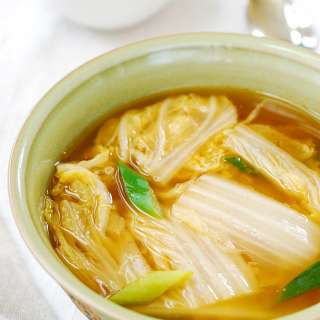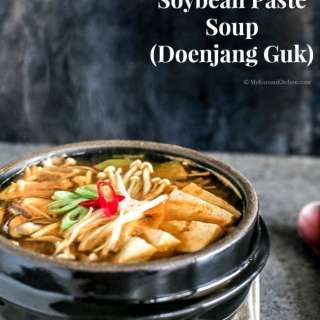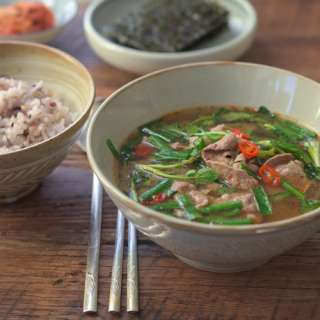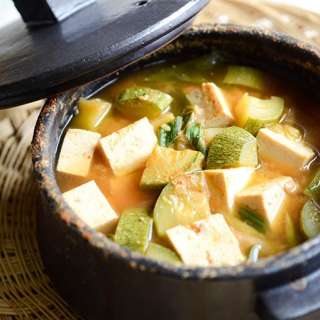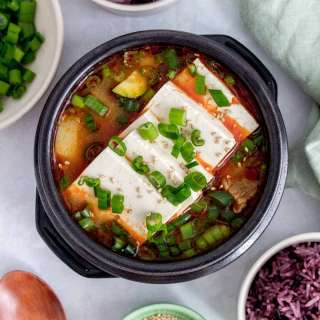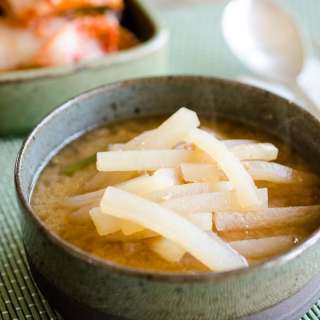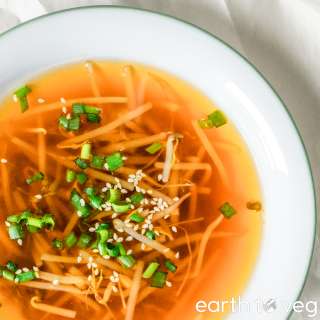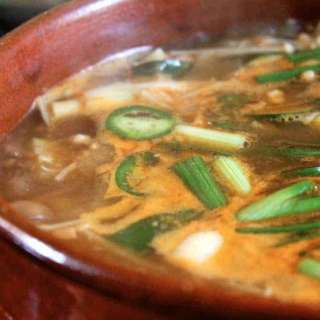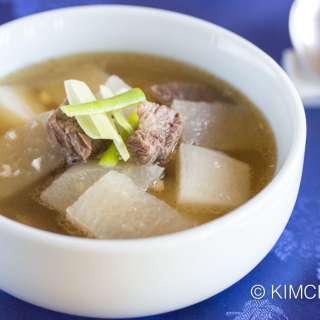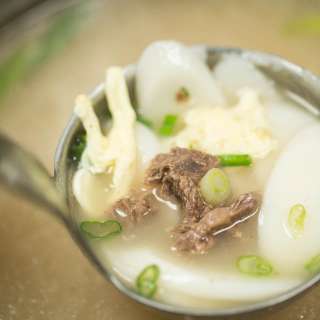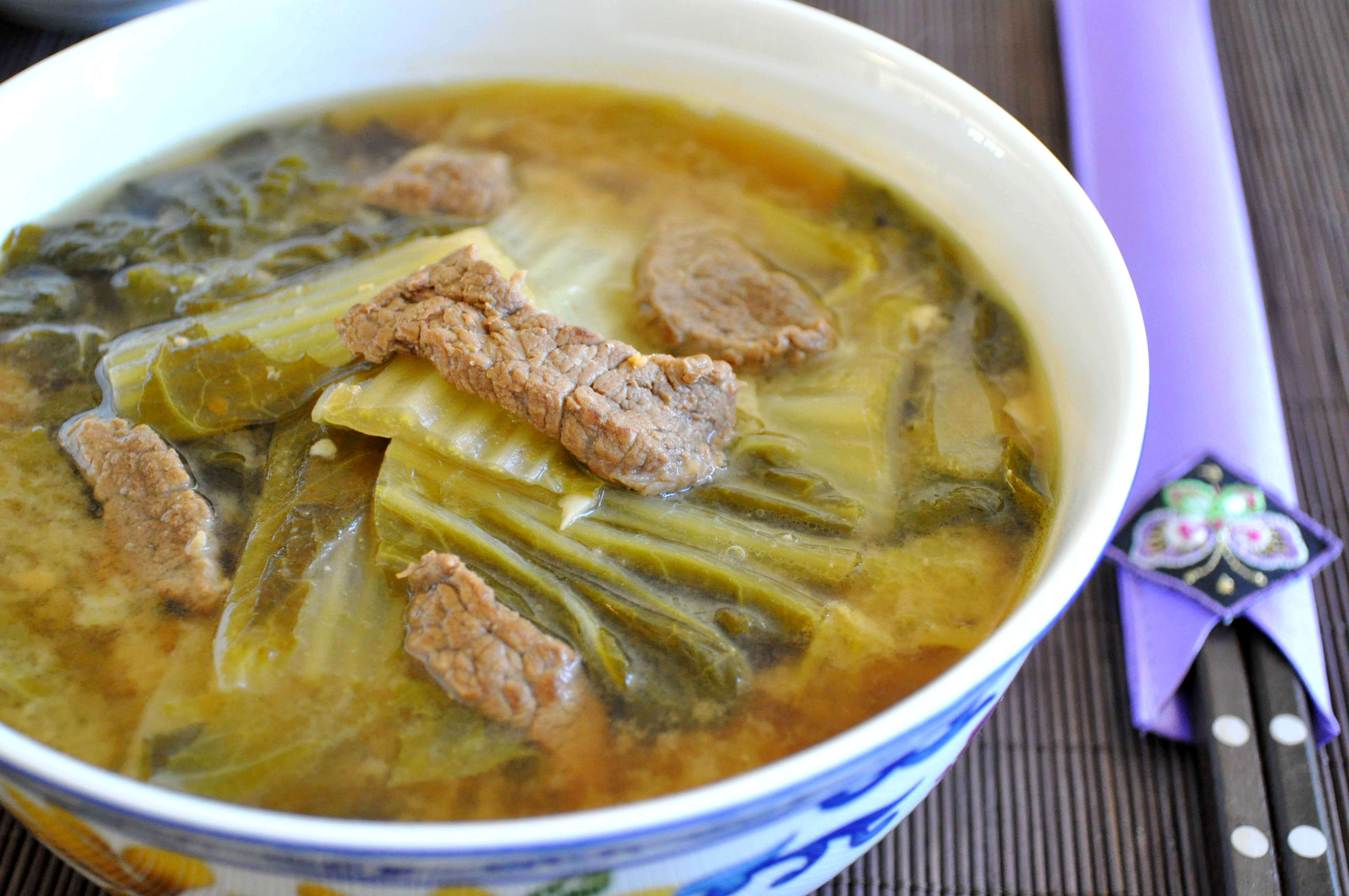
Cabbage Soybean Paste Soup (Baechu Doenjang Guk)
User Reviews
5.0
12 reviews
Excellent

Cabbage Soybean Paste Soup (Baechu Doenjang Guk)
Report
Made with Korean fermented soybean paste, this soup is comfort food for Koreans. Best served with rice and some kimchi.
Share:
Ingredients
- 2 heads Korean small cabbage (or 1 medium size napa cabbage)
- 10 oz beef stew meat (chuck roast)
- 1 Tbs vegetable oil (for frying meat if beef is very lean)
- 11 cups water or anchovy stock or rice water
- 5 Tbs Korean soybean paste (Doenjang), add more to taste
- 1 Tbs miso
- 3 Tbs chopped garlic
- 1 tsp garlic powder
- 3 green onions
Instructions
- First, cut the heads off of the cabbages so it is easier to wash the leaves separately.
- Cut away any damaged or diseased edges of the bigger leaves.
- Cut the leaves into approx. 3 in long pieces and set aside. How big you cut your cabbage is somewhat of a personal preference. Some Koreans like to cut them pretty short or thin. The size of the pieces really does not affect the taste but more varies the appearance and the texture. I like my pieces a bit long to give the soup a more heartier feel and texture.
- Cut the stew meat into smaller, thinner strips that can be easily eaten in one bite. When cutting the meat, try to cut against the grain. Because the pieces are so small and because they will be cooked thoroughly in the soup, it is not as important but cutting against the grain will ensure the meat will melt in the mouth along with the cabbage.
- If the beef is very lean, add some oil to a large soup pot. Stir fry the beef and chopped garlic on medium high heat until the meat is slightly cooked.
- Once the beef is slightly browned, add water or anchovy stock or rice water.
- Add Korean soybean paste and miso paste to the soup. Adding miso is really not traditional but I really like the touch of sweetness and smoothness it adds to the soup. It takes a while for the soybean paste to fully disperse throughout the soup so let it boil first and taste before adding more.
- Bring the soybean paste soup to a boil. Add cabbage and bring to a boil again. Reduce heat to medium low and simmer for 20 minutes.
- After it has simmered for 20 minutes, add green onions, garlic powder and cook for another few minutes. Serve with some rice and kimchi. Other banchans such as myulchi bokkeum and maleun saewoo bokkeum will go really well with this soup.
Notes
- Serve with some rice and kimchi. Other banchans such as myulchi bokkeum and maleun saewoo bokkeum will go really well with this soup.
- My favorite cabbage to use is the Korean small cabbage or green seoul, but I know these cabbages are not easy to come by. Napa cabbage works really well too.
- I know many traditional recipes will tell you to boil the cabbages first in water and then use the cooked cabbage in the soup. I cooked this way for years and one day discovered that the soup tastes fine (probably the cabbage is less chewy when pre-cooked) even if you don’t pre-cook the cabbage. Cooking the cabbage once instead of twice saves a lot of time and energy without losing much in flavor, so I’m all for it!
Nutrition Information
Show Details
Calories
144kcal
(7%)
Carbohydrates
13g
(4%)
Protein
11g
(22%)
Fat
6g
(9%)
Saturated Fat
3g
(15%)
Cholesterol
24mg
(8%)
Sodium
369mg
(15%)
Potassium
686mg
(20%)
Fiber
3g
(12%)
Sugar
5g
(10%)
Vitamin A
760IU
(15%)
Vitamin C
62.8mg
(70%)
Calcium
188mg
(19%)
Iron
1.8mg
(10%)
Nutrition Facts
Serving: 8Serving
Amount Per Serving
Calories 144 kcal
% Daily Value*
| Calories | 144kcal | 7% |
| Carbohydrates | 13g | 4% |
| Protein | 11g | 22% |
| Fat | 6g | 9% |
| Saturated Fat | 3g | 15% |
| Cholesterol | 24mg | 8% |
| Sodium | 369mg | 15% |
| Potassium | 686mg | 15% |
| Fiber | 3g | 12% |
| Sugar | 5g | 10% |
| Vitamin A | 760IU | 15% |
| Vitamin C | 62.8mg | 70% |
| Calcium | 188mg | 19% |
| Iron | 1.8mg | 10% |
* Percent Daily Values are based on a 2,000 calorie diet.
Genuine Reviews
User Reviews
Overall Rating
5.0
12 reviews
Excellent
Other Recipes
